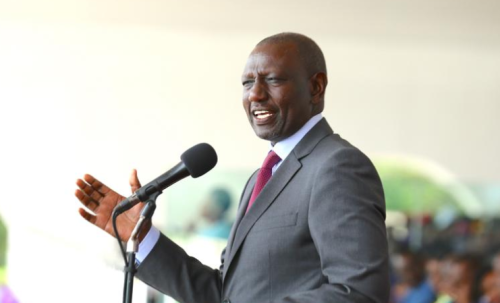President William Ruto has received a detailed report from the Presidential Task Force on the Review of the Legal and Regulatory Framework Governing Religious Organizations.
The task force, chaired by former Gachoka MP and ex-NCCK Secretary-General Mutava Musyimi, presented its findings at State House, advocating for a series of substantial reforms aimed at enhancing the oversight of religious institutions in Kenya.
The report was commissioned in the wake of the Shakahola massacre, a tragic event that underscored the dangers of unchecked religious extremism. In response, President Ruto highlighted the critical need to balance the protection of religious freedoms with measures to prevent their potential misuse. “We will continue to safeguard and protect the freedom of religion, but at the same time mitigate its potential abuse to harm Kenyans,” he stated during the presentation.
Central to the task force’s recommendations is the creation of a Religious Affairs Commission, a new body tasked with overseeing the registration, regulation, and monitoring of religious organizations. This commission would play a pivotal role in ensuring that all religious institutions adhere to the law and uphold ethical standards.
The task force also proposed the introduction of the Draft Religious Organizations Bill 2024. This legislation would mandate the re-registration of all religious institutions through a comprehensive vetting process. The aim is to eliminate organizations that engage in extremist activities or operate under cult-like practices, thereby protecting the public from potential harm. Additionally, the bill would grant the Registrar of Religious Organizations the authority to deregister such entities and publicize their names, promoting transparency and accountability.
The report suggests adopting a hybrid regulatory model, combining self-regulation with government oversight. This approach would allow religious organizations to maintain a degree of autonomy while ensuring compliance with national laws and regulations. Moreover, the task force recommended amending the Kenya Information and Communication Act to better regulate religious content in media, thus preventing the dissemination of harmful or extremist messages. This amendment is intended to hold media outlets accountable for broadcasting content that could incite violence or hatred.
In another key recommendation, the task force proposed setting educational standards for religious leaders to ensure competence and ethical conduct. This initiative aims to uphold high standards of leadership within religious communities, contributing to a more informed and responsible religious landscape.
President Ruto expressed his gratitude to the task force for their thorough work and for incorporating the views of many Kenyans. He acknowledged the significant challenges posed by the misuse of religion and underscored the necessity of a regulatory framework that respects religious freedoms while ensuring public safety. Reflecting on the impact of the Shakahola tragedy, he remarked, “What we recently witnessed at Shakahola was the biggest attack not only on religion but also on our identity as a nation that professes faith in God. This is why I set up this task force.”
He assured the public that the government would carefully review the report and take the necessary steps to implement its recommendations. “We will take the next steps to ensure that the excellent work you have done translates into protecting freedom of religion, safeguarding places of worship, and ensuring that this freedom is coupled with protection against those who misuse religion for personal gain,” President Ruto affirmed.


















